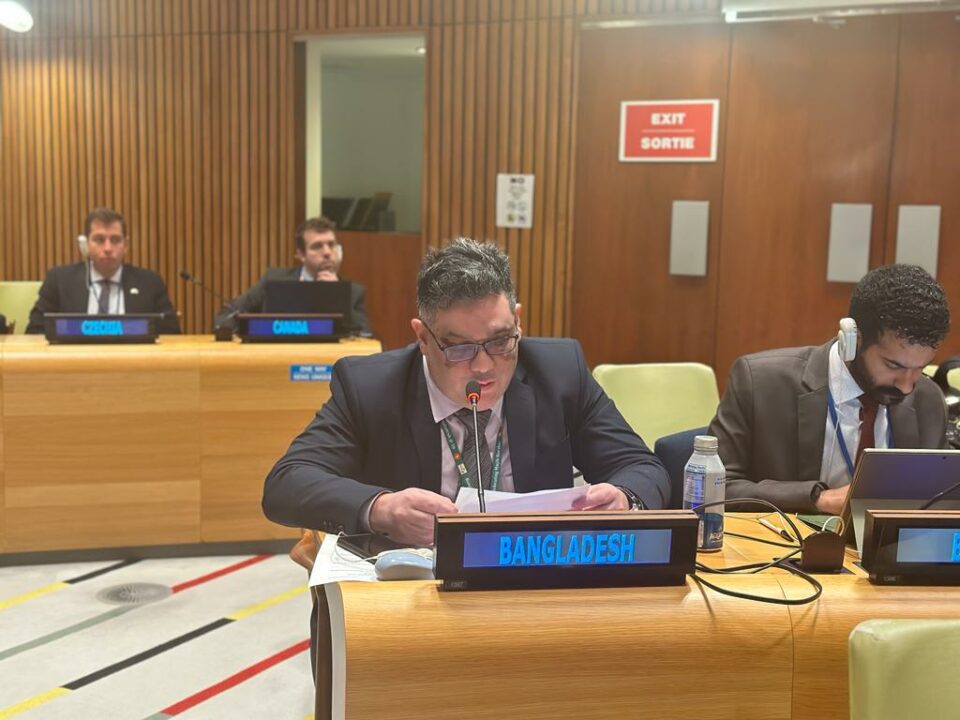Thank you, Mr. Chair,
We thank distinguished Assistant Secretary-General for the useful briefing on the report of the Secretary-General.
Bangladesh, with its commitment to international peace and security, is always supportive to UN’s peace activities; and has fulfilled its obligations under all major multilateral disarmament treaties. Bangladesh was one of first few countries in South Asia to join the Anti-personnel Mine Ban Treaty and we completed the treaty obligations in full by destroying our stockpiles within the stipulated timeframe.
Mr. Chair,
Despite having efforts and notable progresses made by the United Nations in addressing the threat of mines and explosive remnants of war (ERWs); explosive ordnance contamination has continued to endanger the lives of civilians; and hindering the access to services and delivery of humanitarian assistance. We are concerned that 9,198 casualties in 2022 – more than one every hour – caused by explosive ordnance, including explosive remnants of war, mines and improvised explosive devices and civilians continued to be the most affected, constituting 73 per cent of all casualties in 2022.
In the United Nations, when we are talking about leaving no behind; when we are preparing for the Summit of the Future, it is important to put special focus on the victims of explosive ordnance who are at risk of being left behind in development and humanitarian fields.
Mr. Chair,
Allow me to highlight a few points,
First, we commend the efforts of the United Nations for the universalization and implementation of legal instruments related to mine actions. In this regard, we also refer to the action mentioned in the SG’s New Agenda for Peace – reducing the human cost of weapons, and the recommendation – achieving universality of treaties banning inhumane and indiscriminate weapons. We also underscore the importance of the integration of mine action into humanitarian assistance, sustainable development and peace and security initiatives.
Second, it is critical to extend support to the affected states in developing and implementing national strategies, formulating laws and policies that guarantee the rights of persons with disabilities including survivors. Therefore, we emphasize on the technical assistance and capacity building support to national authorities on mine action activities.
Thirdly Mr. Chair, in 2022, explosive ordnance incidents involving peacekeepers killed 16 and injured 72 others, which is an increase in fatalities from the last year. We share our concern on the safety and security of peacekeepers, at the same time we would like to highlight the role of Peacekeeping missions in protecting civilians, management of weapons and ammunition and providing technical assistance to national authorities through Mine Action component of the Missions. The peacekeepers should be adequately trained and equipped to ensure their safety and security as well as to improve the situation of the host country. In this regard, we echo the appeal of the Secretray-General to support peace operations deployed to high-threat environments, including through the provision of equipment, bilateral training in line with United Nations standards and the reinforcement of expertise within the United Nations.
Fourth, sustaining peace cannot be achieved especially in the post conflict situation, without effectively addressing the social and economic consequences of mines on the civilian population residing there as well as the refugees and other displaced persons returning to their homes. In this regard, we emphasize on the integration of mine action in the peacebuilding priorities where applicable. We also emphasize enhancing delivery of explosive ordnance risk education and sharing information on contamination with humanitarian responders assisting communities.
Fifth, we are encouraged to see that gender parity in United Nations mine action programmes was improved in 2022. However, there is still an overall lack of gender parity in technical mine action positions. We need to continue our efforts to ensuring gender parity in mine action by not only increasing the staffs/human resources but also reaching more women through different activities.
Mr. Chair,
Before concluding, I would like to thank the delegation of Poland for their efficient facilitation of the draft resolution entitled “Assistance in Mine Action”. Bangladesh is happy to co-sponsor the resolution and looking forward to its consensus adoption.
I thank you all.

